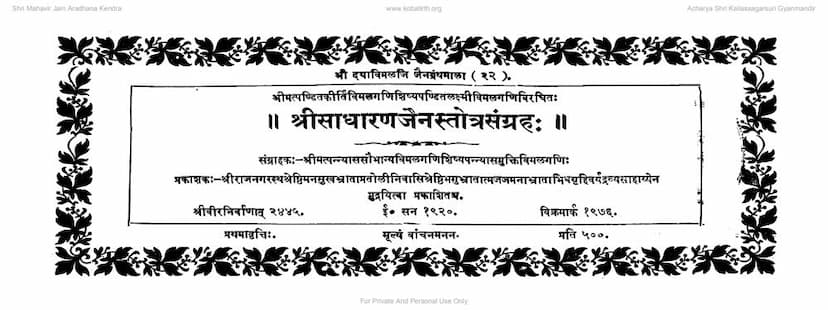Sadharan Jain Stotra Sangraha
Added to library: September 2, 2025

Summary
Here's a comprehensive summary of the Jain text "Sadharan Jain Stotra Sangraha" by Muktivimal Gani, based on the provided pages:
Book Title: Sadharan Jain Stotra Sangraha (Collection of General Jain Hymns) Author: Muktivimal Gani Publisher: Mansukhlal Shah Publication Year: 1920 CE (2445 Veer Nirvana Samvat)
This compilation, the "Sadharan Jain Stotra Sangraha," is presented as the 22nd volume in the "Shri Dayavimalji Jain Granthmala." It was collected by Muni Muktivimal Gani, a disciple of Nyas Saubhagyavimal Gani. The publication was made possible through the financial assistance of Shri Mansukhlal Shah, son of Shri Bhagubhai and grandson of Shri Jagmalbhai, residents of Patoli and esteemed citizens of Rajnagar. The text is explicitly marked "For Private And Personal use only."
The collection primarily features hymns dedicated to various Tirthankaras, highlighting their virtues, divine attributes, and the paths to liberation they teach. The hymns are characterized by their devotional nature, philosophical depth, and poetic beauty, employing various meters and stylistic devices.
Key Hymns and Themes:
The "Sadharan Jain Stotra Sangraha" contains several significant stotras, each with its unique focus:
-
Shri Shantinath Jinastotra (Hymn to Lord Shantinath): This is a prominent hymn within the collection, composed in the Vasanta Tilaka meter. It praises Lord Shantinath for his divine qualities and the path to peace and liberation he offers.
- Key Praises for Shantinath:
- He is revered by celestial beings (Indras of Lokantikas).
- He renounced worldly pleasures and kingdom for the sake of humanity's liberation.
- He embodies immense peace and tranquility.
- His influence is so profound that it eradicates ignorance and suffering.
- His teachings are like nectar, guiding beings across the ocean of existence.
- He is the embodiment of pure knowledge and detached compassion.
- His divine presence is compared to the sun dispelling darkness.
- Key Praises for Shantinath:
-
Sadharan Jinastotra (General Hymn to a Jin/Tirthankara): Attributed to Acharya Shri Gyanvimal Suri of the Tapa Gachcha lineage, this hymn offers a general invocation and praise to any Tirthankara.
- Key Praises:
- The Tirthankara is the source of ultimate well-being and liberation.
- Their form is described as beautiful, auspicious, and filled with divine qualities.
- Their teachings are the means to overcome suffering, attachment, and ignorance.
- Devotion and contemplation of the Tirthankara lead to spiritual progress and ultimate salvation.
- The hymn emphasizes the Tirthankara's role as a guide and saviour for all beings.
- Key Praises:
-
Shri Rishabhdev Stuti Garbhit Shri Siddhachal Stotra (Hymn to Lord Rishabhdev within the context of Shri Siddhachal): This hymn is dedicated to Lord Rishabhdev, the first Tirthankara, and is intrinsically linked to the sacred pilgrimage site of Siddhachal. It highlights the sanctity of the site and the spiritual benefits of devotion and pilgrimage there.
- Themes:
- Praise for Lord Rishabhdev's divine nature, renunciation, and mastery over passions.
- The spiritual significance of Siddhachal as a place of liberation.
- The spiritual journeys and achievements of various monks and individuals who attained salvation at Siddhachal are narrated.
- The hymn serves as an invocation for spiritual progress and the attainment of liberation.
- Themes:
-
Shri Parshvanath Stotra (Hymn to Lord Parshvanath): This hymn, also attributed to Acharya Shri Vibhudh Vimal Suri, focuses on Lord Parshvanath, the 23rd Tirthankara.
- Key Praises for Parshvanath:
- He is revered by celestial beings and is the ultimate refuge.
- His divine form is described with immense beauty and auspiciousness.
- He is the dispeller of suffering and the giver of peace.
- His teachings emphasize non-violence, truth, and detachment.
- The hymn speaks of the devotional practices and the profound spiritual benefits derived from meditating on and worshipping Lord Parshvanath.
- Key Praises for Parshvanath:
-
Ashta Prakar Puja Garbhit Shri Jineshwar Ashtaka (Eight Types of Worship Hymn to the Lord Jin): This section presents an eight-verse hymn that outlines the eight-fold worship practices prescribed in Jainism. Each verse likely describes a specific aspect of the worship, such as offering sandalwood, flowers, incense, lamp, food, etc.
- Themes:
- Detailed description of the eight types of worship (Ashta Prakar Puja).
- The spiritual significance and benefits of performing these acts of devotion.
- The purification of the self and the attainment of liberation through these practices.
- Themes:
-
Shri Siddha Chakra Stotra (Hymn to the Siddha Chakra): This hymn is dedicated to the Siddha Chakra, a significant symbol in Jainism representing the nine supreme beings.
- Themes:
- The Siddha Chakra is revered as the means to overcome obstacles, achieve spiritual prosperity, and attain liberation.
- The hymn emphasizes the power of chanting and devotion to the Siddha Chakra.
- Themes:
Overall Significance:
The "Sadharan Jain Stotra Sangraha" serves as a valuable resource for Jain devotional practices. It aims to inspire spiritual contemplation and encourage the followers of Jainism to engage in prayer, meditation, and virtuous actions. The hymns, written in classical Sanskrit, are meticulously composed and offer profound insights into Jain philosophy and the path to spiritual perfection. The collection reflects the rich tradition of Jain devotional literature and the deep reverence held for the Tirthankaras.